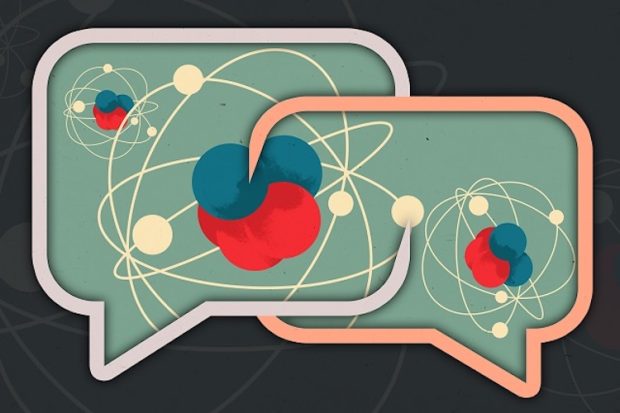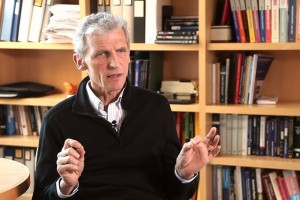Arts ‘on Prescription’
Psychoneuroimmunologist Daisy Fancourt on social prescribing and the effects of arts on our health and well-be...
One of the things I worked on was the discovery of the Higgs boson at CERN’s Large Hadron Collider, which was announced in 2012. That was a really significant moment in physics; it had a really big impact on the field and beyond for a number of reasons.
First of all, starting with physics, we have this rather wonderful theory of the fundamental forces and interactions of nature that we call the Standard Model. It predicts infinitely small particles interacting with each other that can build up to make the world around us. It’s an amazing achievement mathematically and scientifically, but in its most naive form, it doesn’t work because it doesn’t allow these infinitely small particles to have mass, and we know that they do.
The way around that, a mathematical trick that was invented in the early 60s, even before we knew about all the particles of the Standard Model, was to introduce a kind of background energy quantum field which fills the whole Universe, and it’s by interacting with this quantum field that particles acquire mass. In a way, it’s not something to have of their own; it’s something they get because they’re kind of sticking to this field. And then you ask yourself: that’s a nice theory; it makes the maths work, but I don’t really believe it until I see a bit more evidence. I’m not a theorist; I’m an experimentalist, so I’d like to see a bit more evidence than just how the maths looks good.

So how do you tell that there’s something to fill in the space? You can tell, for instance, that there’s air in this room in many ways, but one way you can tell it is that the sound waves from my mouth can travel through it, so I’m making pressure waves in the air, and they travel to the microphones which pick it up. That wouldn’t happen if there was no air in the room: in a vacuum, no one can hear you talk about physics. The Higgs boson is the analogy of the sound waves but for this background energy field of the Universe. So if this background energy field exists, if you hit it really hard, then it will wobble. And it’s a quantum field, so a quantum wobble is actually a particle; it’s a quantum particle, and that’s the Higgs boson.
So the impact of the Higgs boson was much more than ‘oh, we’ve just found the last particle of the Standard Model’, which indeed it was; that’s true as well. But the main thing was it proves that this background energy field of the universe is there, which vindicates the kind of idea about how all massive fundamental particles get their mass.
That’s a huge impact: it was a massive prediction of the Standard Model of something completely new that turned out to be right, so it’s a big confidence builder in our understanding of the nature in that sense. But another way it has an impact is that it was the last particle of the Standard Model. All my physics career we’ve had the Higgs boson on the horizon: we think it is there, but we don’t really know. Now we know.
So, what’s on the horizon now? What’s going on now? The way I think of physics as an experimentalist, I think we’re explorers; I think that when you look at the Large Hadron Collider, it was studying nature at these high energies and small distance scales that we’ve never seen before, I think of it as like we’re landing on in a new country, and we’re exploring this new country, and we’re wandering across it and seeing what we can find. For all my career, theoretical physicists have drawn a map and said, this is what you should find; go and look and we went and looked, and indeed, there was the Higgs boson; they were right.
Now, they made up some other things that they said should be on the map that would be beyond the Standard Model, and they are not there at the moment. Actually, they have no real map anymore; we’re really on the edge of the map. So, to my mind, that’s both a nerve-wracking but also really exciting period of physics because we’re really into the unknown now, and a lot of the ideas of what should have been found at the Large Hadron Collider, things like supersymmetry or extra dimensions and things that there were arguments that they should be found along with the Higgs or near the Higgs, they’re not there. I mean, they might be; we’ve got a lot more data to come, but they certainly weren’t as obvious as many theorists told us they would be. So we’re really off the map, we’re really sailing into this ocean now, leaving the islands behind, and for the first time in my career, an experiment is ahead actually, and I really like that. I do find that very exciting.
So that’s a huge impact. It really changed the way we think about experimental physics in a way, and the impact of that is still being absorbed. The theoretical physics community is still absorbing the information that a lot of their expectations were not correct. Other ones might be harder to find than others, or maybe we just need some better ideas to explain these things; maybe the old ideas before the LHC were just not right. These are arguments that this physics should be near the Higgs, things that we call naturalness and stuff; maybe they’re misleading arguments; maybe nature doesn’t have to behave the way we expect it to. We’re in the realm where the unexpected may show up.
What I’ve talked about now really is its impact on our understanding of nature in the sense of particle physics. But I was sitting in my university department at the University College London; we saw a huge change in the attitude of people to physics with the discovery of the Higgs. I was writing in newspapers and doing some TV programs and things around the time, and the general public was excited about it in a way that I didn’t really expect because it’s quite hard to understand what it means. But somehow, it caught people’s imagination in a way that I didn’t expect. That changed the perception: I think it wasn’t just the Higgs, though; it was this huge machine, CERN and the excitement of this, the technology and all the things that go with it, and the international collaboration and everything. But somehow, Higgs’s discovery raised the profile of all of that and raised the profile of exploratory science and research in general in a way that may not be very common. It does happen; gravitational waves were another big discovery that had a huge impact, and I think the Higgs was one of those things, and I think we’re still seeing the knock-on effects of that.
Of course, it’s gone out of the public eye; these things don’t go on forever, obviously, but still, CERN is better known than it was, particle physics is better known than it was, and the people that really matter to us in universities a lot which is the young kids who are deciding what to study, more of them are deciding to study physics again now. And I think some of that is because of the Higgs boson.
There was a feeling that maybe physics was the science of the 20th century and maybe the 21st century belongs entirely to, say, biology and the life sciences and things. I think it changed that perception in the sense that there’s still exciting new physics, new research to be done, exciting technologies being developed as well and important new knowledge to be gained in physics.
I think, although the public interest obviously died away, we didn’t go back to the same place. I think we’ve stayed up and stayed in the place where physics is seen as more relevant, more interesting, more exciting than it was before. And that’s because it had a real impact on the science. It also had this impact on the wider society, I think, which was very important.
The future direction is, of course, the fact that we’re off the map now means that it’s a lot less clear than we were. So we really knew that we had to build the Large Hadron Collider because we knew that if the Higgs existed, we would find it, and if it didn’t, it was important to prove that it didn’t. There’s a much more active discussion now about, okay, we’ve got this open landscape here; what’s the best way to explore it? How do we do it? What’s the most efficient way?
Then, there are also experiments in the neutrino area. Neutrinos changed the Standard Model completely because, in the original version, they didn’t have mass, and now they do. But we don’t know whether that mass comes from the Higgs, so there’s good physics to be done with that, too. But what we know we will do, I mean, in the next 10 years that will definitely happen, is we will be exploring the properties of the Higgs boson in great detail, which may not sound super exciting or exploratory, but actually the Higgs is such a fundamentally new object, it’s unique, there’s nothing else like it. It is the manifestation of this background energy field of the Universe, so actually understanding its properties in some depth is really important, and that’s what we’re doing at the Large Hadron Collider right now, and that will definitely happen, that will happen over the next 10 years. It’s just that these projects take so long to build that we’re already thinking, okay, but after that, what do we do next? And that’s where it’s not clear; that’s where there’s a real good active scientific discussion to be had and then a technological, and a political discussion as well because these projects are so big.

Psychoneuroimmunologist Daisy Fancourt on social prescribing and the effects of arts on our health and well-be...

Bioinformatician Tim Hubbard on the ‘100,000 Genomes Project’, how to use genome data in diagnostics and treat...

Physicist Wolfgang Ketterle on achieving superfluidity, atoms marching in lockstep, and room temperature super...